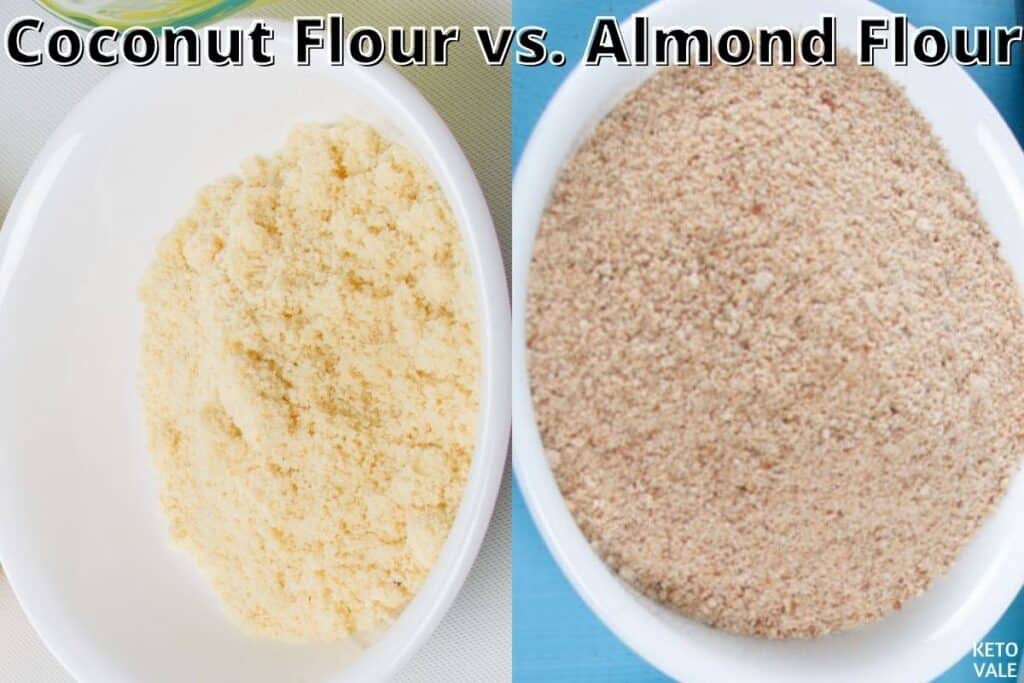If you’re sensitive to gluten or on a low-carb diet, then you can’t put a price on coconut and almond flour.
After all, these flours allow you to eat ‘normal’ foods again, such as bread, buns, pancakes, waffles, and even cookies. But when it comes to the keto diet, which one is better?
In this guide, we’ll review the differences between almond flour and coconut flour to help you decide which one is better for the keto diet.
Plus, we’ll provide tips for how to use them in your favorite low-carb recipes.
Almond Vs Coconut Flour Nutrition Facts Table
Coconut flour is made from dried coconut meat. It’s made by squeezing the milk from the coconut meat and then drying the meat at a low temperature – then grinding it into flour.
A 100-gram serving of organic coconut flour from Whole Foods contains the following (*):
- 400 calories
- 13.33 grams of fat
- 60 grams of carbs (26.7 grams of net carbs)
- 33.3 grams of fiber
- 13.33 grams of protein
Almond flour (also called almond meal) is made from ground almonds. The almonds are blanched in hot water to remove the skins and then they are ground into a fine flour.
A 100-gram serving of almond flour from Whole Foods contains the following (*):
- 600 calories
- 56.33 grams of fat
- 20 grams of carbs (13.3 grams of net carbs)
- 6.7 grams of fiber
- 20 grams of protein
How Many Carbs In Coconut Flour and Almond Flour?
Both coconut and almond flour are considered low-carb foods, but almond flour is lower in carbs than coconut flour.
A 100-gram serving of coconut flour contains around 26.7 grams of net carbs while the same serving of almond flour contains around 13.3 grams of net carbs.
This number may vary based on the brand you buy. You can calculate the net carbs of your flour by subtracting the fiber content from the total carbohydrates.
Almond Flour vs. Coconut Flour: Which is Healthier?
Deciding which is healthier – coconut flour or almond flour – is like picking the favorite out of your kids. Both flours provide a wide range of health benefits – it’s hard to pick which is healthier!
In terms of overall nutrition, almond flour provides a more complete profile of vitamins and minerals. It’s a good source of vitamin E, magnesium, calcium, iron, and potassium.
However, almond flour is higher in phytic acid than coconut flour. Phytic acid is known as an anti-nutrient compound because it binds to the digestive system, induces inflammation, and prevents the absorption of some minerals, such as calcium, iron, and zinc (*).
For this reason, some people find it hard to digest almond flour. If you are making your own almond flour at home, then you can work around this by soaking your nuts in water overnight to deactivate the anti-nutrient compounds before drying them and turning them into flour.
Coconut flour is also much higher in fiber. Research shows that eating more fiber can help assist with BMI and body weight, control cravings, reduce appetite, prevent obesity, support gut health, improve digestion and regularity, regulate blood sugar levels, and reduce the risk of heart disease (*)(*)(*).
If you’re trying to get more fiber in your diet, then adding coconut flour to the mix is a no-brainer.
Plus, coconut flour contains medium chain fatty acids, which are easier to digest than many fats and can be readily used as fuel or energy if you are already in ketosis.
MCTs provide lots of other benefits, too. They can help support healthy blood sugar levels and weight, prevent dementia and support brain health, and boost immune health due to their antibacterial properties (*)(*)(*).
So, to sum it up, both flours have their pros and cons. If you are not allergic to either – and you’re looking for a replacement for white or wheat flour – then consider trying both.
Are Almond Flour and Coconut Flour Keto-Friendly?
Yes, both coconut flour and almond flour are keto-friendly flours. They are gluten-free, low in carbs, and contain anti-inflammatory nutrients that aid in gut and immune health – so they fit into your clean keto diet.
However, if you’re strictly looking at the carbohydrate content, then almond flour is the more keto-friendly of the two because it contains fewer net carbs. We recommend giving both a try and counting your macronutrients if you need to stay in ketosis.
Both provide great flavor and nutrition for your favorite meals – they even taste great and compliment each other best when used together!
Almond flour tends to be a denser flour to cook with because it contains more moisture, so keep this in mind as it creates a heavier final product – such as bread.
If you’re cooking with coconut flour alone, then be prepared to add more moisture to your recipe – such as eggs, nut milk, butter, oil, etc. – or you could cut the amount of coconut flour with almond flour to ensure your recipe doesn’t dry out.
Almond flour provides a nuttier flavor while coconut flour tends to be more mild, so keep this in mind when picking a flour to cook with. In general, almond flour also tends to be a cleaner swap for recipes that call for gluten flour, meaning that you can use it in the same amount.
Simply ditch the gluten flour and swap out equal parts almond flour to make your favorite bread, pancakes, waffles, buns, biscuits, or cookie recipes.
Here are some keto recipes you can follow using almond and coconut flour:
- Almond Flour Bread
- Parmesan Almond Flour Biscuits
- Coconut Flour Cheese Biscuits
- Coconut Flour Pancakes
Almond Flour to Coconut Flour Ratio
To substitute almond flour for coconut flour, use a ratio of about 1:3, as coconut flour is much more absorbent than almond flour. For every 1 cup of almond flour, use about 1/3 cup of coconut flour.
Additionally, for each cup of coconut flour used, add an extra egg and a bit more liquid to the recipe to compensate for coconut flour’s high absorbency. Adjust the recipe as needed for the right consistency and flavor.
Final Thoughts
Both almond flour and coconut flour are suitable for a low-carb or keto diet, but almond flour is much lower in net carbs – giving it the winning edge.
However, coconut flour is higher in fiber and contains less phytic acid – a hard to digest compound that prevents the absorption of some minerals, so don’t discount it!
You can safely use either on your low-carb diet as a replacement for gluten flours. We recommend experimenting with them in your favorite bread, pancake, or cookie recipes.
See more:







